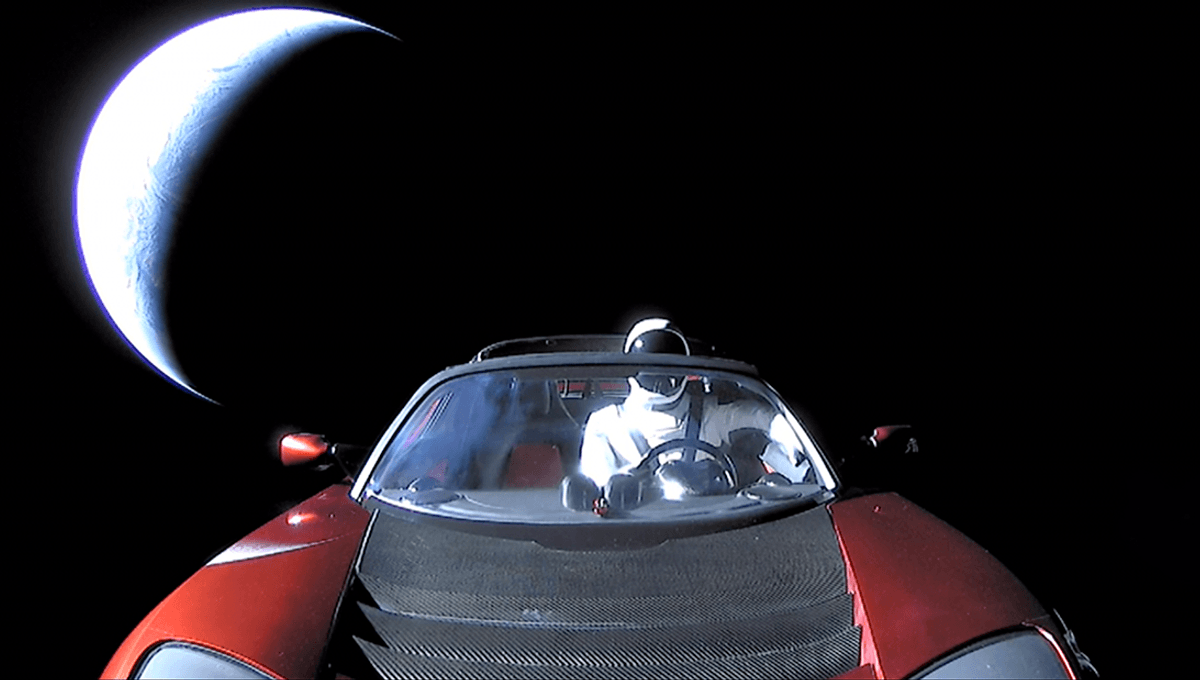
Six years ago, Elon Musk’s SpaceX launched a Tesla into space, in a stunt that even the most hardened Musk haters would grudgingly admit is pretty cool.
The Roadster has since been on one hell of a journey, currently moving away from Earth at the impressive speed of 25,290 kilometers per hour (15,715 miles per hour), with an arguably more impressive fuel efficiency of 10,671 kilometers per liter (25,100 miles per gallon), at the time of writing.
Since its launch on February 6, 2018, the car has orbited the Sun 4.1 times according to tracker Where Is Roadster, rolling over as it goes. In 2018, we got a close look at the vehicle as it made a close approach to Earth.
Keeping an eye on the car isn’t exactly astronomers’ most pressing concern (for instance, what the hell is going on with all those vanishing stars), but a few have tried to calculate the fate of the vehicle, and whether it poses a threat to the Earth.
In 2018, a paper did just this, though it was a difficult task due to the car’s eccentric orbit.
“The Roadster bears many similarities to Near-Earth Asteroids (NEAs), which diffuse through the inner Solar System chaotically through (i) repeated close encounters with the terrestrial planets, and (ii) the effects of mean-motion and secular resonances,” the team explain in the paper.
“Initially, NEAs reach their orbits from the more distant main belt via strong resonances (such as the secular 𝜈6 resonance or the strong 3:1 mean-motion resonance with Jupiter). When entering these escape routes, many NEAs are driven onto nearly-radial orbits that plunge into the Sun.”
This puts impact likelihood with terrestrial planets at relatively low, at slightly more than 2 percent. The Tesla, however, is a little different.
“The initial Tesla orbit grazes that of the Earth, so one might expect an initial period with enhanced collision probabilities with the Earth before it is randomized onto a more NEA-like trajectory,” the team continued. “It is therefore unclear whether the Tesla is likely to diffuse to distant, strong resonances and meet the same fate as the wider NEA population, or whether it would first strike one of the terrestrial planets.”
Looking at the Tesla’s orbit, which crosses the orbit of Mars and Earth, the team was able to predict the likelihood it would crash into the terrestrial planets (including our favorite one, Earth).
The car will make another close approach in 2047 at about 5 million kilometers (3.1 million miles). Beyond 100 years, repeat close encounters with the planets make long-term predictions of the car’s chaotic orbit “impossible”.
“However, using an ensemble of several hundred realizations, we were able to statistically determine the probability of the Tesla colliding with the Solar system planets on astronomical timescales,” the team wrote.
On a much longer timescale, the team calculated that the car has roughly a 22 percent probability of hitting Earth, a 12 percent chance of colliding with Venus, and about the same probability of hitting the Sun as hitting Venus. Fortunately for Musk, this will happen on a timescale of millions of years, and is unlikely to affect Tesla stock prices.
The Starman placed in the vehicle, assuming it is still intact and somehow achieves sentience, may pray for a sooner impact. While traveling through space, the dummy has listened to David Bowie’s “Space Oddity” over 624,000 times in one ear, and “Life On Mars?” has played in his other ear more than 841,000 times.
The study is published in Aerospace.
Source Link: The Tesla Elon Musk Launched Into Space Has A 22 Percent Chance Of Hitting Earth (Eventually)